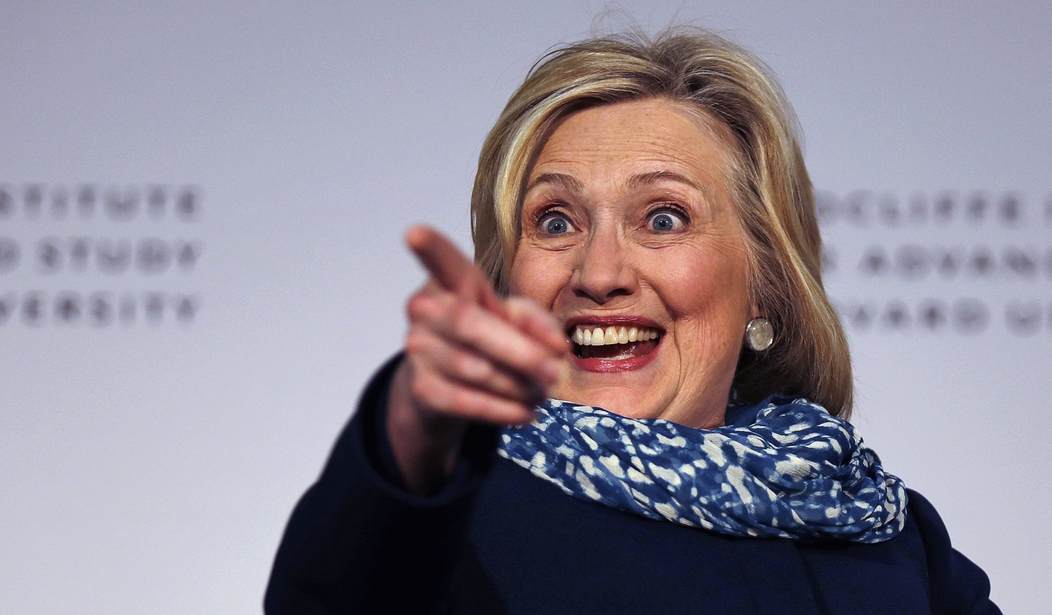For the third time in her life, Hillary Clinton toured the nation, hoping to be loved. Hoping to break the cycle that the more people see of her, the less they like her.
The third time wasn’t the charm.
This weekend, the Clintons took the Hill and Bill Tour to The Forum in Inglewood, Calif., in what amounts to home turf for them these days. Thanks to low demand, ticket prices plummeted to as low as $2 each.
And pundits who remark on the tour inevitably point out that she didn’t visit Wisconsin this time, either.
But it doesn’t seem to have dampened Hillary’s sense of worth or entitlement. After all, she wuz robbed.
“I tell candidates who come to me that you can run the best campaign, you can even become the nominee, and you can have the election stolen from you,” is her latest robotic refrain she repeats to tiny audiences from Rachel Maddow to nearly empty auditoriums.
Her sycophants on the Left keep reminding her she won the popular vote and assert that she was only kept from her birthright of First Woman President by small-margin victories in swing states where Vladimir Putin and Jim Comey brought just enough voters over to get the outmoded Electoral College to go Trump’s way.
But the retort to this from the Right also fuels Hillary’s unjustified self-image. “The Russians did not stop Hillary Clinton from campaigning in Wisconsin,” Trump defenders love to point out.
But this clever riposte assumes a fact not in evidence — that the more voters saw of Hillary Clinton, the more likely they were to vote for her. And while Democrats like to pretend that Scott Walker was somehow “suppressing” the vote, the evidence of history suggests otherwise.
The biggest voter suppression mechanism in American politics is Hillary Clinton’s personality.
It is far more likely that if Hillary had campaigned more in Michigan and Wisconsin, those states would have been spared the expense of the Jill Stein recount.
For the entire 40 years of Hillary Clinton’s public life, one thing has been consistent: The less people see of her, the more popular she is.
The Deplorables of Arkansas in the late ’70s, were not thrilled by the snooty feminist from Chicago who refused to take her husband’s name—so she was hidden at the Rose Law Firm where money could be funneled to the Clintons through her supposed legal prowess (a continuing theme).
Before Obamacare became an epithet, the term “HillaryCare” was used to stop the Clinton socialized medicine plan of the 1990s. And if you think that Hillary’s involvement in it didn’t have as much to do with popular rejection of it as its content did, then you weren’t there.
Sure, she won in New York after the Republicans went through a candidate shuffle when Giuliani declined to run (due to personal issues that seem tame today)—but hey, that was New York.
Hillary was the inevitable president in 2008—until people had to contemplate four years of the screech that Rush Limbaugh wickedly said reminded men of their ex-wives, over the dulcet tones of Barack Obama.
And so it goes. When Hillary is in the background, her popularity rises. When she is front and center, it goes down.
In 2016, her two major opponents sounded like something from a wildly unrealistic political satire—a 74-year-old socialist, and a 69-year-old reality TV star. She had to stack the deck to beat one, and lost to the other.
And there is nothing more deceptive than the charts that show the up and down of Hillary’s approval rating during the 2016 campaign. Here’s a little clue: they basically range between 40 and 45 percent—in polls that have a 5 percent margin for error!
About a third of Trump voters in every poll say their main motivation was to vote against Hillary—but we are told her campaigning with that shriek in Wisconsin would have made the difference? Give me a break.
Late voters went toward Trump, she complains. That proves it was the Russians and Comey. Yes, in every election, undecideds go for the new thing. In the 2016 election, Hillary Clinton was the closest thing possible to an unpopular incumbent. Late undecideds, as a rule, go 2 to 1 to the challenger in that situation.
Hillary Clinton is right, however, when she says: “I take responsibility for all my decisions, but that’s not why I lost.”
That is correct. You lost because of who you are, not what you did.
America is well acquainted with Hillary Clinton, and the only thing that has ever made hearts grow fonder is her absence.









Join the conversation as a VIP Member